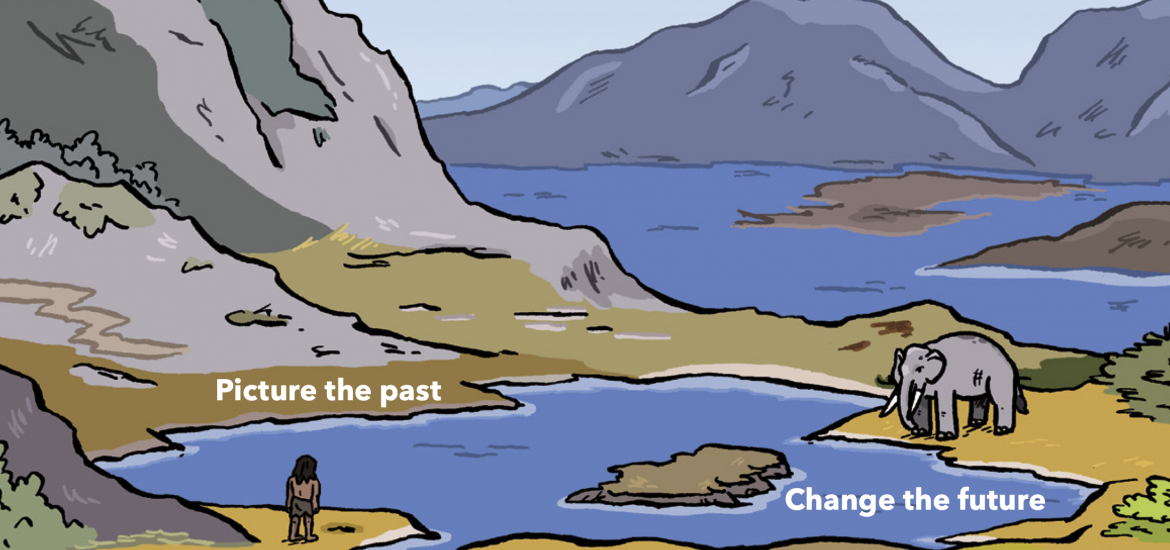- Home
- All News Overview
- Past Global Changes Horizons Volume 2 Is Out!

Wednesday, 22 June, 2022
Past Global Changes Horizons: Picture the past. Change the future.
Volume 2: WARM WORLDS
> Access Volume 2
> Order your FREE hard copy by 30 June here
The Past Global Changes (PAGES) project is pleased to announce the second volume of its new paleoscience magazine for teenagers, young adults, and people of all ages interested in Earth’s history. Past Global Changes Horizons, published by PAGES annually, highlights sciences of the past (paleosciences) and is written in an easy to understand, visual format, for those interested in, and wanting to learn more about, environmental issues and global climate change. The scientific information provided in the magazine is derived directly from the scientists themselves.
Through direct scientific knowledge about past environmental and climate changes, the objective is to inform readers so that they will be able to understand the current environmental crisis.
Using comics, pictures, and drawings that support short papers with strong messages about past sciences and understanding changing future stakes, Past Global Changes Horizons covers articles about different environments across the planet, from caves to oceans, and from The Past Global Changes (PAGES) project is pleased to announce the second volume of its new paleAntarctica to the Rift valley in Africa.
This new issue shows how some warm periods occurred in the past, and the challenging adaptations that Earth and humanity had to undergo to cope with climate change impacts. In addition, it stresses how past warm time intervals were different from the one we are living today, and what it may mean to adapt this time. To do so, this new volume features seventeen original illustrated pieces, including comics, photo-reports and short articles.
What is paleoscience?
Paleoscience is the scientific study of the past. For paleoscientists (geologists, biologists, archeologists, anthropologists,…), the past refers to the time before there were instrumental records. They work on combining data from decades to millions of years of Earth’s history to find out what conditions prevailed on Earth in the past, how things work on a longer time scale compared to present day observations and, in some cases, use this information to assess the future trajectories, and anticipate what will happen.
Why is paleoscience important?
Firstly, by looking at different scenarios in the past, these can be used as examples to better understand the sensitivity of the Earth to changes in the Earth system. Secondly, paleorecords are vital stores of information. They show, for example, that sudden climate change (within decades), ice-sheet collapse, and changes in the chemistry of the ocean, have occurred in the past. They also provide us with long-term contexts for recent changes in climate and environment that we are seeing (e.g. changes in the atmospheric concentrations in greenhouse gases) as well as providing us with information on the natural state of the Earth System before human influence. This means, we can assess which changes are natural, and which one’s are likely to be human induced. Lastly, paleodata can be used to test models that make projections of future climate.
What is the Past Global Changes (PAGES) project?
The PAGES project is a 30-year-strong international effort which focuses on scientific research and networking on measurable changes in climate and biosphere, as well as their interactions with humans, in the past. These changes must occur at a global scale or have impact on the global scale. This scientific research helps to improve projections of future climate and environment.
The majority of PAGES publications are written by paleoscientists who are active in more than 18 different PAGES working groups. Financial support for PAGES comes from the Swiss Academy of Sciences (SCNAT) and the Chinese Academy of Sciences (CAS).
"Students are really more motivated to engage with studying the environmental science curricula within the natural science domain when they have some illustrated, clear -but robust- science for it. They also like the idea of being addressed by real scientists."
(María Andrés-Rodrigo, Science teacher to 3rd and 4th Secondary levels - 14-16 years old-, IES Villanueva de Gállego, Zaragoza, Spain)
"Hotter, colder, drier, wetter - we simultaneously fear and love change, because they show us that we are alive! Our ecosystems and climate have changed a lot over the last millennia. Their history is fascinating because it tells us how the earth, with all these changes, has been enriched with incredible diversity over time. But, let's not mourn the past worlds - let's rather preserve our current one. Let's preserve ourselves from a change we have caused! The warm worlds of the past, patiently built up by the Earth system happened more slowly and with more complexity than the greenhouse effect we are creating, and all its consequences. This issue explains how global change works, what a warm world means, and what we should consider preserving as keys to a sustainable future."
(Boris Vannière, Director of Research, CNRS, Besançon, France & Invited Professor, Institute of Plant Sciences, University of Bern, Switzerland; Horizons editor)
"Horizons is a great adventure, not only because we have the opportunity to address the wide public, but also because it challenges us, palaeoscientists, to communicate with simple words an important and hopeful message: global change may have a great impact on us, but are still on time to do something to stop it!"
(Graciela Gil Romera, Research Fellow, Philipps-Marburg University, Germany and Horizons editor)
---End---
Media Contact:
Chené van Rensburg
PAGES Communications Officer
Email : chene.vanrensburg pages.unibe.ch (chene[dot]vanrensburg[at]pages[dot]unibe[dot]ch)
pages.unibe.ch (chene[dot]vanrensburg[at]pages[dot]unibe[dot]ch)
Contact Horizons editors :
Nathaelle Bouttes : nathaelle.bouttes lsce.ipsl.fr (nathaelle[dot]bouttes[at]lsce[dot]ipsl[dot]fr)
lsce.ipsl.fr (nathaelle[dot]bouttes[at]lsce[dot]ipsl[dot]fr)
Emilie Capron : emilie.capron univ-grenoble-alpes.fr (emilie[dot]capron[at]univ-grenoble-alpes[dot]fr)
univ-grenoble-alpes.fr (emilie[dot]capron[at]univ-grenoble-alpes[dot]fr)
Graciela Gil-Romera : graciela.gil ipe.csic.es (graciela[dot]gil[at]ipe[dot]csic[dot]es)
ipe.csic.es (graciela[dot]gil[at]ipe[dot]csic[dot]es)
Boris Vannière : boris.vanniere univ-fcomte.fr (boris[dot]vanniere[at]univ-fcomte[dot]fr)
univ-fcomte.fr (boris[dot]vanniere[at]univ-fcomte[dot]fr)
> Download English press release
> Download French press release
> Download Spanish press release
Access Volume 2 of Past Global Changes Horizons
Access Volume 1 of Past Global Changes Horizons